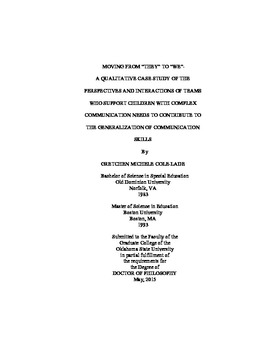| dc.contributor.advisor | Bailey, Lucy E. | |
| dc.contributor.author | Cole-Lade, Gretchen Michele | |
| dc.date.accessioned | 2016-09-29T18:32:34Z | |
| dc.date.available | 2016-09-29T18:32:34Z | |
| dc.date.issued | 2015-05 | |
| dc.identifier.uri | https://hdl.handle.net/11244/45149 | |
| dc.description.abstract | Children with complex communication needs (CCN) face many challenges in their daily life. They can struggle academically and socially if their communicative needs are not supported consistently by those who provide care for them. They frequently use Augmentative or Alternative Communication (AAC) systems or devices to communicate. The purposes of this qualitative case study were to 1) explore the types and meanings of interactions which occurred among the stakeholders as part of their participation on the federally mandated educational team that supports a child with CCN; and 2) to examine how collaborative communicative exchanges transpired among the stakeholders which could potentially support the child with CCN to generalize communication skills. The study is significant because, while much research has examined the efficacy of generalization training with children who have a variety of disabilities, no research has investigated the types and meaning of stakeholder interactions and their potential to influence the child's generalization of skills. This qualitative research design used an instrumental, collective, multiple case study of four teams of stakeholders (n=23) who provide support for children with CCN. Methods included individual interviews, observations in the home and school, and document analysis of IEP communication goals and objectives. Findings for the four cases showed a wide difference in the types and meaning of interactions among teams/stakeholders toward meeting the generalization goals of children with CCN. More specifically, the most cohesive teams were characterized by the consistent sharing of both personal/routine and clinical information among the stakeholders, engaging in informal peer coaching with each other, treating paraprofessionals as integral members of the team, and having IEPs with specific and measurable communication goals. The findings suggest that children are best supported by teams who engage in collaborative interactive exchanges focused on supporting a child's generalization goals. Further research should be conducted into the frequency and type of communication shared, possible peer coaching models in special education, increasing the roles of paraprofessionals, and clarity of IEP goals and objectives. | |
| dc.format | application/pdf | |
| dc.language | en_US | |
| dc.rights | Copyright is held by the author who has granted the Oklahoma State University Library the non-exclusive right to share this material in its institutional repository. Contact Digital Library Services at lib-dls@okstate.edu or 405-744-9161 for the permission policy on the use, reproduction or distribution of this material. | |
| dc.title | Moving from "they" to "we" - A qualitative case study of the perspectives and interactions of teams who support children with complex communication needs to contribute to the generalization of communication skills | |
| dc.contributor.committeeMember | Ormsbee, Christine K. | |
| dc.contributor.committeeMember | Sanders, Jennifer | |
| dc.contributor.committeeMember | Bryant Davis, Kimberly E. | |
| dc.contributor.committeeMember | Romans, John S. C. | |
| osu.filename | ColeLade_okstate_0664D_14079.pdf | |
| osu.accesstype | Open Access | |
| dc.type.genre | Dissertation | |
| dc.type.material | Text | |
| thesis.degree.discipline | Professional Education Studies | |
| thesis.degree.grantor | Oklahoma State University | |
